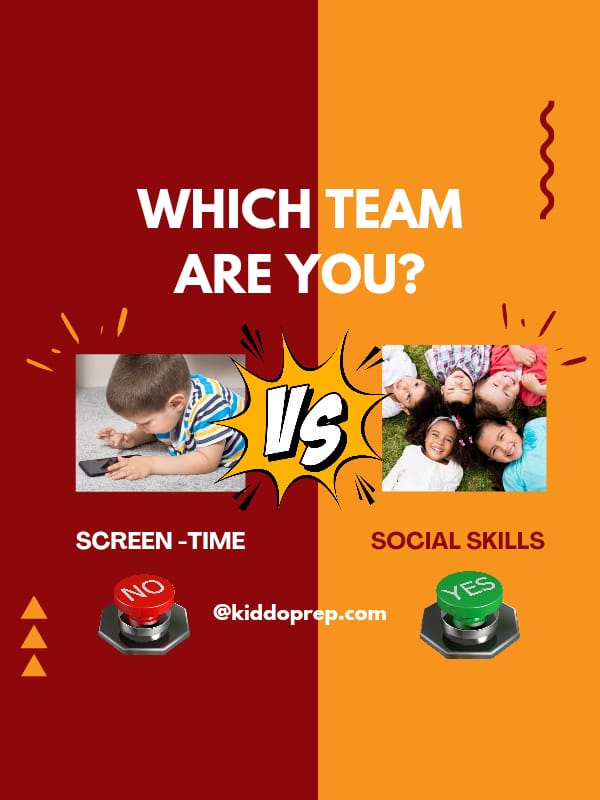
The Unseen Dangers of Excessive Screen Time
As parents, we often find ourselves in a balancing act, trying to manage our busy lives while ensuring our children are happy and engaged. In today’s digital age, it’s tempting to give our little ones a tablet or smartphone to keep them entertained. While it might seem harmless, the growing fear of mobile addiction impacting the social skills of young kids is a concern that deserves our attention.
The Rise of Mobile Addiction
It’s no secret that technology is an integral part of our lives. However, the convenience of screens can quickly turn into dependency, especially for young children who are still developing their social and emotional skills. Studies have shown that excessive screen time can lead to a range of issues, from reduced attention spans to difficulties in forming meaningful social connections.
Scientific Evidence: The Impact on Social Skills
- Reduced Interaction:
A study conducted by the American Academy of Pediatrics found that children who spend more than two hours a day on screens are less likely to engage in face-to-face interactions. This lack of real-world social practice can hinder their ability to read social cues and develop empathy.
- Delayed Language Development:
Research from the University of Toronto highlighted that toddlers who are exposed to screens for more than an hour a day are at risk of delayed language development. Without enough interaction with parents and peers, these children miss out on critical opportunities to practice and learn language skills.
- Behavioral Issues:
The Journal of Child Psychology and Psychiatry published findings indicating that children with high screen time are more prone to exhibit behavioral problems such as hyperactivity and inattention. These issues can further isolate them from social interactions, creating a vicious cycle.
Real-Life Implications
Now I want you to imagine this: Little Timmy is just three years old and loves watching videos on his mom’s smartphone. It keeps him occupied, and his mom can get some chores done. However, over time, Timmy starts preferring screen time over playing with his toys or interacting with other kids. At a family gathering, Timmy struggles to engage with his cousins, opting instead to watch cartoons on his tablet. His parents notice that he rarely makes eye contact and seems uncomfortable in social settings. This scenario is becoming all too common, as more children fall into the trap of mobile addiction. He always hides behind you to avoid people and then asks you to give your phone to play.
The Parent’s Dilemma
Many parents feel a mix of guilt and helplessness. On one hand, screens can be a lifesaver, providing a much-needed break. On the other hand, the fear of mobile addiction and its impact on social skills looms large. The key is finding a balance and ensuring that screen time doesn’t replace valuable opportunities for real-world learning and interaction.
Steps to Mitigate the Impact
As concerned parents, there are proactive and important steps we can take to mitigate the impact of mobile addiction on our children’s social skills:
- Limit Screen Time:
Set clear limits on the amount of screen time your child is allowed each day. The American Academy of Pediatrics recommends no more than one hour of screen time for children aged 2 to 5.
- Encourage Playtime:
Foster an environment where playtime is prioritized. Encourage your child to engage in activities that stimulate their imagination and require interaction with others.
- Be a Role Model:
Children learn by observing their parents. Demonstrate healthy screen habits by limiting your own screen time and engaging in more face-to-face interactions.
- Create Tech-Free Zones:
Designate certain areas of your home, such as the dining room and bedrooms, as tech-free zones. This encourages family members to interact with each other without the distraction of screens.
Kiddoprep Kit: A Solution for Engaging Learning
At Kiddoprep, we understand the challenges parents face in today’s digital world. Our educational kit is designed to provide engaging, screen-free activities that promote learning and social development. Here’s how our kit can help:
- Interactive Books:
Our science, math, and activity books are filled with fun and educational content that encourages children to explore and learn. These books are designed to be used with the included materials, such as ice-cream sticks, pompoms, clay, and dough, making learning a hands-on experience.
- Creative Play:
The kit includes a variety of materials that inspire creativity and imaginative play. From building structures with ice-cream sticks to creating art with crayons and clay, your child will have endless opportunities to express themselves and develop fine motor skills.
- Parental Involvement:
The Kiddoprep kit is designed to foster parent-child interaction. Activities can be done together, providing a wonderful opportunity for bonding and communication. This interaction is crucial for developing social skills and emotional intelligence.
- Balanced Learning:
With a focus on both academic and creative activities, the Kiddoprep kit ensures a well-rounded approach to early childhood education. It helps children develop cognitive skills while also encouraging social and emotional growth.
Conclusion: Embrace a Balanced Approach
While screens are an unavoidable part of modern life, it’s essential to strike a balance. By being mindful of screen time and actively promoting screen-free activities, we can help our children develop the social skills they need to thrive. The Kiddoprep educational kit is a valuable tool in this journey, offering engaging and enriching experiences that go beyond the screen.
Invest in your child’s future today with Kiddoprep. Let’s make learning fun, interactive, and screen-free! Do leave a comment for any queries.

